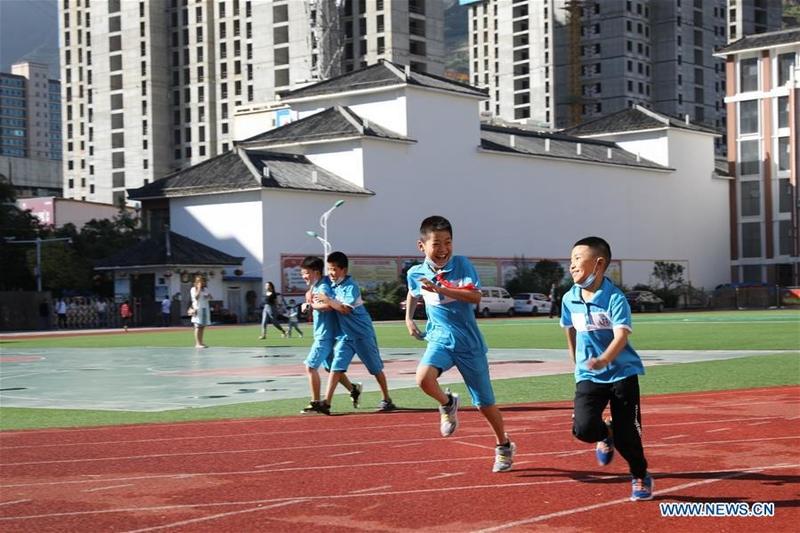 In this Aug 31, 2020 file photo, pupils run on the playground at a primary school in Longnan city, Northwest China's Gansu province. (PHOTO / XINHUA)
In this Aug 31, 2020 file photo, pupils run on the playground at a primary school in Longnan city, Northwest China's Gansu province. (PHOTO / XINHUA)
Inspired by President Xi Jinping's instructions on sports development, governing body officials, event organizers, teachers and scholars have pledged to push ahead with a collective effort to build the nation into a world sporting power.
I feel honored and motivated by the president's speech, which attaches great importance to sports as a pillar for the development of other aspects ranging from public health to cultural soft power and economic growth.
Bao Mingxiao, director of the China Sports Economic Research Center
Having shown his ardent interest in sports on multiple occasions, Xi's recent speech at a symposium addressing the development of China's sports sector has drawn an enthusiastic response from the country's sports community.
Xi's call came as the nation continues to increase its prowess in competitive sports, mass fitness, the sports industry and school physical education.
Citing sport's importance in improving people's health, fulfilling their pursuit of better lives and promoting all-around development, Xi urged sports, health and education departments to enhance cooperation to provide better fitness services, guarantee more exercise for young people, boost consumption in sports business and reform elite sports talent development.
Xi also called for a resolute stance against doping in sports and urged organizers to prepare the 2022 Beijing Winter Olympics to high standards, while presiding over a symposium held last week to solicit opinions on China's development in the 14th Five-Year Plan (2021-25) period.
READ MORE: Xi stresses development of education, culture, health, sports
Responding to the president's call, the General Administration of Sport of China has rolled out a plan to host a series of domestic championships during the National Day holiday to evaluate athletes' preparations for the delayed 2020 Tokyo Olympics while also entertaining the country's sports fans, who were unable to enjoy elite athletic performances during the COVID-19 shutdown.
"To bring top-level events back on the domestic sports calendar and do it cautiously under stringent infection prevention measures will send a strong message about our country's recovery from the pandemic," said Wang Lei, deputy director of GASC's competitive sports department. "This is how we could do our part to implement the president's requirements in practice."
Beginning on Saturday with the National Swimming Championships, the holiday series includes elite-level competitions in 14 summer and five winter sports and six junior tournaments through Oct 14.
As a highlight of the series, a junior basketball tournament, the "Spark Cup", will for the first time see middle school teams compete against the youth squads of professional clubs in the same event.
The tournament, which will run from Sunday to Oct 6 at Tsinghua University High School, was initiated after the GASC and the Ministry of Education released a guideline last week, which was approved by the State Council, that outlines 37 measures aimed at improving students' health through wider sports participation.
The joint effort is expected to facilitate the upgrading of school physical education programs by drawing more coaching and competition organizing expertise from the country's State-run sports system, which is overseen by the GASC, to campuses.
"To improve the quality of school PE programs while encouraging students to exercise more is always high on the central government's agenda," said Li Jinyang, deputy director of the GASC's youth department.
"Increasing exchanges between the professional sports and school PE systems is where our focus will be as expected by the president," he said.
Ren Haijiang, head of the PE department at Tsinghua University Primary School, echoed Li's sentiments, saying that school PE classes should be made more enjoyable and diversified to ensure each student gets interested and skilled in at least one sport.
Preparation of venues
As China prepares for the 2022 Winter Olympics in Beijing and co-host city Zhangjiakou in Hebei province, Xi's close attention to the capital's readiness for the Games, underlined by his instructions last week, previous visits to the venues and multiple meetings with Thomas Bach, head of International Olympic Committee, has motivated organizers to stage the milestone event in a green, shared, open and clean way.
"Our preparation of venues for the Games has entered the final stage," said Liu Yumin, director of the planning, construction and sustainable development department of the 2022 Winter Olympics organizing committee.
"We are confident and on track to deliver all the venues on time to host a fantastic, extraordinary and excellent Games which will inspire the whole nation."
READ MORE: 500-day countdown to 2022 Winter Olympics celebrated
With planning for test events and post-Games venue operations proceeding cautiously under COVID-19 prevention protocols, Beijing is progressing smoothly to be the world's first city to host both Games, after having organized the 2008 Summer Olympics, and to integrate social and economic development in the region into preparatory work for the Games.
"I feel honored and motivated by the president's speech, which attaches great importance to sports as a pillar for the development of other aspects ranging from public health to cultural soft power and economic growth," said Bao Mingxiao, director of the China Sports Economic Research Center, who was invited to attend the symposium last week.


